一般将来时
一般将来时
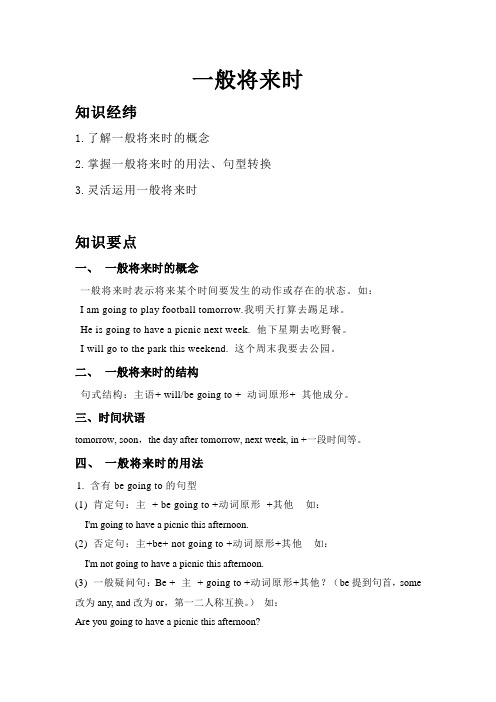
一般将来时知识经纬1.了解一般将来时的概念2.掌握一般将来时的用法、句型转换3.灵活运用一般将来时知识要点一、一般将来时的概念一般将来时表示将来某个时间要发生的动作或存在的状态。
如:I am going to play football tomorrow.我明天打算去踢足球。
He is going to have a picnic next week. 他下星期去吃野餐。
I will go to the park this weekend. 这个周末我要去公园。
二、一般将来时的结构句式结构:主语+ will/be going to + 动词原形+ 其他成分。
三、时间状语tomorrow, soon,the day after tomorrow, next week, in +一段时间等。
四、一般将来时的用法1. 含有be going to的句型(1) 肯定句:主+ be going to +动词原形+其他如:I'm going to have a picnic this afternoon.(2) 否定句:主+be+ not going to +动词原形+其他如:I'm not going to have a picnic this afternoon.(3) 一般疑问句:Be + 主+ going to +动词原形+其他?(be提到句首,some 改为any, and改为or,第一二人称互换。
)如:Are you going to have a picnic this afternoon?肯定回答:Yes, I am.否定回答:No, I’m not.2. 含有will的句型(will可用于所有人称,shall只用于第一人称I和we)( 1 ) 肯定句:主+ will +动词原形+其他如:I will play football tomorrow.(2) 否定句:主+ won’t +动词原形+其他(will后加not成won't)如:I won’t play football tomorrow.(3) 一般疑问句:Will + 主+ +动词原形+其他?(will提到句首,some改为any, and改为or,第一二人称互换) 如:Will you play football tomorrow?肯定回答:Yes, I will.否定回答:No, I won’t.五、一般将来时的特殊疑问句一般情况下,一般将来时的对划线部分有三种情况。
一般将来时态

this evening
What is the mouse going to do this evening? It is going to do its homework.
will
What is she going to do? She’s going to shop/ go shopping...
They are going to dance.
will
What are they going to do this evening? They are going to watch TV.
will
句式的变化规则:
1.变否定句—---在be/will后加not 。 2.变一般疑问句------将be/will动词提前。 (主语是第一人称I 时,变一般疑问句 时将I 变you) 3.特殊疑问句(也就是对划线部分提问) -----要用特殊疑问词what +一般疑问句。
表示“不肯”、“不能”等: e.g. We asked her to be the director but she won’t agree. Oil and water won’t mix. The car won’t start.
可表示未来情况的还有:
be going to 结构 现在进行时 一般现在时 be about to 结构 be + 不定式结构
系动词am,is,are的原形都是 。 例如: 系动词 , , 的原形都是be。 例如: 的原形都是 People will have robots in their home. 人们的家中将会有机器人。 人们的家中将会有机器人。 There will be one country in the world. 世界上将会只有一个国家。 世界上将会只有一个国家。 shall适用于第一人称 ,We;而will适用于所有人称。 适用于第一人称I, ; 适用于所有人称。 适用于第一人称 适用于所有人称 通常可以用will来代替 来代替shall。 通常可以用 来代替 。 will,shall均可缩写为:'ll,如: 均可缩写为: , , 均可缩写为 I will= I'll; ; she will = she’ll;will not 和shall not分别可以 ; 分别可以 缩写为 won't 和shan't。 。
初中英语语法一般将来时

一般将来时一.一般将来时的定义:表示将来某一个时间将要发生的动作或存在的状态,表示将来经常或重复发生的动作。
二.一般将来时的标志:tomorrow(明天),the day after tomorrow(后天)next year(明年)next month(T—个月)next week(下一个星期)3.一般将来时的构成:1.主语^be(am,is,are)going to+动词原形+..例如:(1).I am going to play football tomorrow.明天我将要踢足球.(2).She is going to watch a movie the day after tomorrow.后天她要看一场电影.2.主语+will/shall+动词原形+.....说明:(l).will/shall有时可以和be going to互换;(2) .will是万能的,shall只能用在第一人称,主语是I,we.(3) .will和shall的后而接动词原形)例如shall/will go to Beijing next month.。
will=I11)下个月我将要去北京.(2) .You will come to see me tomorrow.(you will=you'll)明天你将要来看我.(3) .She will read English tomorrow moming.(She will=She'll)明天早上她将要读英语.四.句一般将来时的式:1.肯定句:(1) ..主语+be(am,is,are)going to+动词原形+......(2) ..主语+will/shall+动词原形+.....例句和上面一样,就不举了.2.否定句:(1)..主语+be(am,is,are)not going to+动词原形+......例如:(A):I am not going to play basketball tomorrow.明天我不将踢足球.(B).She is not/isn't going to visit Shanghai next year.明年她不将参观上海.(2)..主语+will/shall not+动词原形+.....(A).I shall not go to school the day after tomorrow o后天我不将上学了(B).I will not write my homework this evening.(will notl=I won't)今晚我不将写作业(C).She will not see a movie next week.(will not=won't)下个星期她将不看一场电影.3.一般疑问句:(A).Am/Is,Are+主语+going to+动词原形+....例如(A).—Am I going to see my grandfather tomorrow?明天我将去看我的爷爷吗?—Yes,you are.是的,你将去.(B).— Are you going to listening to the tape tomorrow?明天你将听录音带吗?—No,I am not.不,我不将.(C). —Is she going to Beijing next year? 明年我将去北京吗?-Yes,she is.是的,她将.(2).Will//shall+主语+动词原形+…例如(A). —Shall we play volleyball next class?下一节课我们将打排球吗?-Yes,you will,是的,你们将.(B). —Will you come here next week?下个星期你将来这儿吗?-Yes,I will.是的,我将.(C).--Will she teach us this term?这学期,她将教我们吗?—Yes,she will.是的,她将.4.特殊疑问句:(1).What(Where,How...)+be(am,is,are)+主语+going to+动词原形+...?例如:(A).—What are you going to do tomorrow? 明天你将要做什么?—rm going to the park? 我将要去动物园.(B).--Where are you going to swim? 你将要去哪儿游泳?—I'm going to swim in the river.(2). What(When,Where,How...)+主语+动词原形+...?例如:(A).---What will you do next week?下个星期你将要做什么?--1 will do my homeworko 我将要做作业.(B).—How will she come here tomorrow?明天她将要怎么来这儿?—She will come here by bus 。
一般将来时
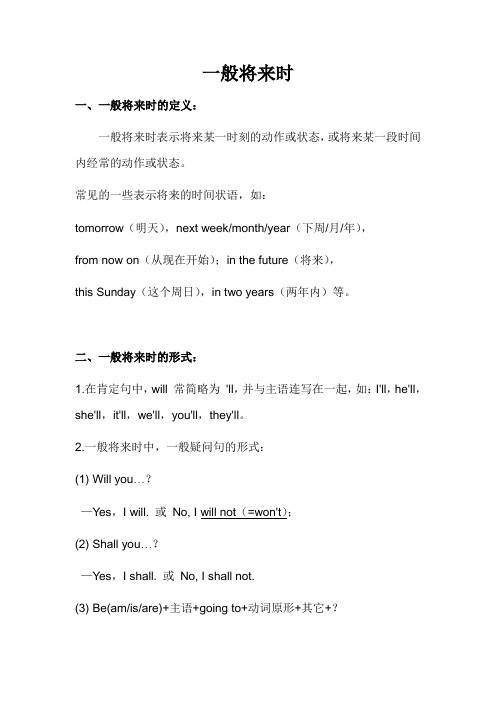
一般将来时一、一般将来时的定义:一般将来时表示将来某一时刻的动作或状态,或将来某一段时间内经常的动作或状态。
常见的一些表示将来的时间状语,如:tomorrow(明天),next week/month/year(下周/月/年),from now on(从现在开始);in the future(将来),this Sunday(这个周日),in two years(两年内)等。
二、一般将来时的形式:1.在肯定句中,will 常简略为'll,并与主语连写在一起,如:I'll,he'll,she'll,it'll,we'll,you'll,they'll。
2.一般将来时中,一般疑问句的形式:(1) Will you…?—Yes,I will. 或No, I will not(=won't);(2) Shall you…?—Yes,I shall. 或No, I shall not.(3) Be(am/is/are)+主语+going to+动词原形+其它+?如:Are you going to swim tomorrow?—Yes, I am./ No, I'm not.Is he/she going to play football next weekend?—Yes, he/she is./ No, he/she isn't.Are they going to go shopping this Sunday?—yes, they are./ No, they aren't.三、一般将来时的用法:1.一般将来时由“助动词shall(用于第一人称),或者will(用于第一、二、三人称)+动词原形”构成。
这种将来意义常常夹杂着情态意义即带有说话人的主观态度和看法,比如表示“预见”。
有时也含有“意愿”或“意图”的意思。
一般将来时
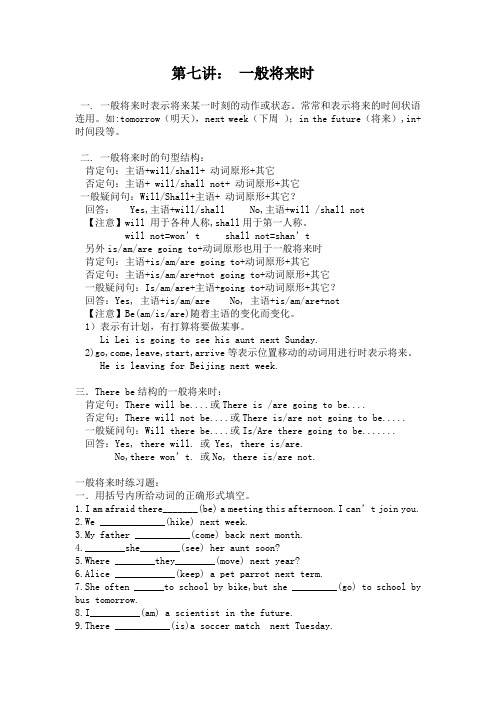
第七讲:一般将来时一. 一般将来时表示将来某一时刻的动作或状态。
常常和表示将来的时间状语连用。
如:tomorrow(明天),next week(下周);in the future(将来),in+时间段等。
二. 一般将来时的句型结构:肯定句:主语+will/shall+ 动词原形+其它否定句:主语+ will/shall not+ 动词原形+其它一般疑问句:Will/Shall+主语+ 动词原形+其它?回答: Yes,主语+will/shall No,主语+will /shall not【注意】will 用于各种人称,shall用于第一人称。
will not=won’t shall not=shan’t另外is/am/are going to+动词原形也用于一般将来时肯定句:主语+is/am/are going to+动词原形+其它否定句:主语+is/am/are+not going to+动词原形+其它一般疑问句:Is/am/are+主语+going to+动词原形+其它?回答:Yes, 主语+is/am/are No, 主语+is/am/are+not【注意】Be(am/is/are)随着主语的变化而变化。
1)表示有计划,有打算将要做某事。
Li Lei is going to see his aunt next Sunday.2)go,come,leave,start,arrive等表示位置移动的动词用进行时表示将来。
He is leaving for Beijing next week.三.There be结构的一般将来时:肯定句:There will be....或There is /are going to be....否定句:There will not be....或There is/are not going to be.....一般疑问句:Will there be....或Is/Are there going to be.......回答:Yes, there will. 或 Yes, there is/are.No,there won’t. 或No, there is/are not.一般将来时练习题:一.用括号内所给动词的正确形式填空。
一般将来时的定义、结构、例句、用法
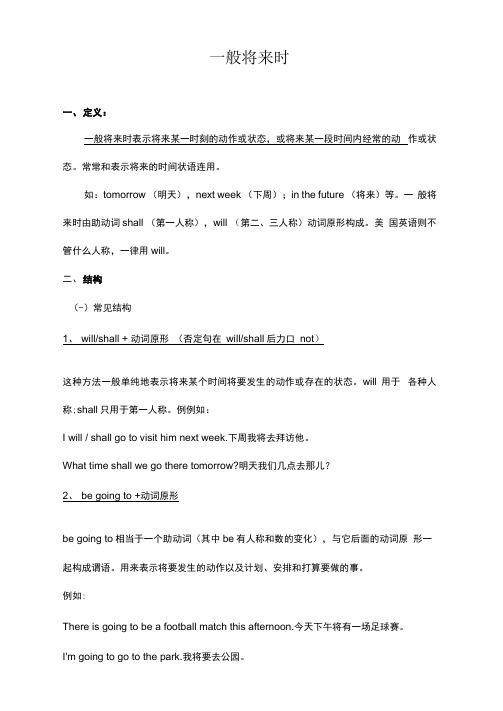
一般将来时一、定义:一般将来时表示将来某一时刻的动作或状态,或将来某一段时间内经常的动作或状态。
常常和表示将来的时间状语连用。
如:tomorrow (明天),next week (下周);in the future (将来)等。
一般将来时由助动词shall (第一人称),will (第二、三人称)动词原形构成。
美国英语则不管什么人称,一律用will。
二、结构(-)常见结构1、will/shall + 动词原形(否定句在will/shall后力口not)这种方法一般单纯地表示将来某个时间将要发生的动作或存在的状态。
will用于各种人称;shall只用于第一人称。
例例如:I will / shall go to visit him next week.下周我将去拜访他。
What time shall we go there tomorrow?明天我们几点去那儿?2、be going to +动词原形be going to相当于一个助动词(其中be有人称和数的变化),与它后面的动词原形一起构成谓语。
用来表示将要发生的动作以及计划、安排和打算要做的事。
例如:There is going to be a football match this afternoon.今天下午将有一场足球赛。
I'm going to go to the park.我将要去公园。
(-)常用结构1、用于"I expect, I'm sure, I think, I wonder 等的宾语从句"中。
Don't worry about the exam. I'm sure you'll pass.不要担心这次考试,我确信你会通过的。
2、用于祈使句和陈述句中。
Work hard and you will succeed.如果你努力,就会成功的。
3、与表示时间或条件的状语从句连用。
一般将来时总结
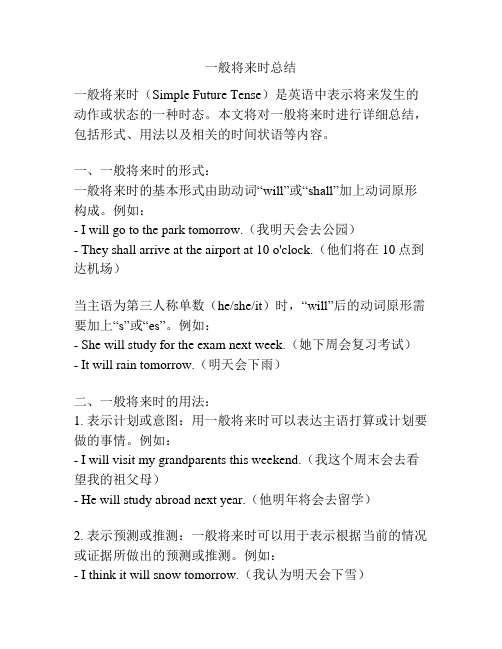
一般将来时总结一般将来时(Simple Future Tense)是英语中表示将来发生的动作或状态的一种时态。
本文将对一般将来时进行详细总结,包括形式、用法以及相关的时间状语等内容。
一、一般将来时的形式:一般将来时的基本形式由助动词“will”或“shall”加上动词原形构成。
例如:- I will go to the park tomorrow.(我明天会去公园)- They shall arrive at the airport at 10 o'clock.(他们将在10点到达机场)当主语为第三人称单数(he/she/it)时,“will”后的动词原形需要加上“s”或“es”。
例如:- She will study for the exam next week.(她下周会复习考试)- It will rain tomorrow.(明天会下雨)二、一般将来时的用法:1. 表示计划或意图:用一般将来时可以表达主语打算或计划要做的事情。
例如:- I will visit my grandparents this weekend.(我这个周末会去看望我的祖父母)- He will study abroad next year.(他明年将会去留学)2. 表示预测或推测:一般将来时可以用于表示根据当前的情况或证据所做出的预测或推测。
例如:- I think it will snow tomorrow.(我认为明天会下雪)- They believe she will win the competition.(他们相信她会赢得比赛)3. 表示意愿或允诺:一般将来时可以表达主语的意愿或承诺要做某事。
例如:- I will help you with your homework.(我会帮你做作业)- He will stop smoking.(他将戒烟)4. 表示预定的事件或安排的计划:一般将来时可以用于表示已经安排好的事件或计划。
一般将来时的四种句型结构
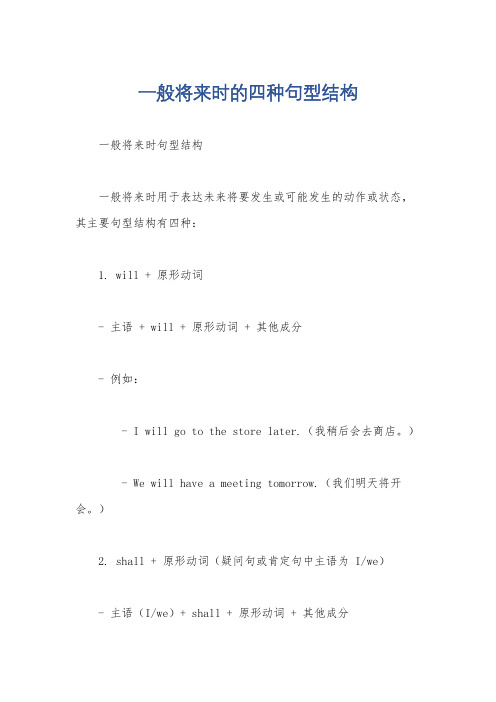
一般将来时的四种句型结构一般将来时句型结构一般将来时用于表达未来将要发生或可能发生的动作或状态,其主要句型结构有四种:1. will + 原形动词- 主语 + will + 原形动词 + 其他成分- 例如:- I will go to the store later.(我稍后会去商店。
)- We will have a meeting tomorrow.(我们明天将开会。
)2. shall + 原形动词(疑问句或肯定句中主语为 I/we)- 主语(I/we)+ shall + 原形动词 + 其他成分- 例如:- Shall I open the window?(我打开窗户好吗?)- We shall arrive at 10:00 AM.(我们将在上午 10:00 到达。
)3. be going to + 原形动词- 主语 + be going to + 原形动词 + 其他成分- 例如:- I am going to watch a movie tonight.(我今晚要去看电影。
)- They are going to build a new house.(他们打算建造一所新房子。
)4. be + about to + 原形动词- 主语 + be about to + 原形动词 + 其他成分- 例如:- I am about to leave.(我就要走了。
)- The train is about to depart.(火车就要出发了。
)一般将来时的用途一般将来时主要用于以下几种情况:- 表达未来将要发生的肯定动作或事件- 表达未来可能发生的动作或事件- 表示计划或打算- 表达预测或推测- 表示请求或建议(使用 shall 时)- 表示承诺或保证(使用 will 时)。
- 1、下载文档前请自行甄别文档内容的完整性,平台不提供额外的编辑、内容补充、找答案等附加服务。
- 2、"仅部分预览"的文档,不可在线预览部分如存在完整性等问题,可反馈申请退款(可完整预览的文档不适用该条件!)。
- 3、如文档侵犯您的权益,请联系客服反馈,我们会尽快为您处理(人工客服工作时间:9:00-18:30)。
一般将来时一、单项选择一般将来时1.— Did you tell Mother you have passed the exam?— Oh, I forgot. I _______ her now.A.will call B.will be callingC.am calling D.am to call【答案】A【解析】试题分析:考查情态动词。
句意是:你告诉Rose关于考试的事了吗?--哦,我忘了,我现在就打电话给她。
这里用will表示临时决定,故选A项。
考点 : 考查情态动词2.We are always told that only through hard work our goals in our study.A.we will achieve B.we have achieved C.have we achieved D.will we achieve 【答案】D【解析】试题分析:考查倒装句:句意:有人告诉我们只有通过努力学习我们在学习上才能达到目标。
That引导的是宾语从句,宾语从句是用only+介词短语,构成的状语,句子用部分倒装,根据句意要用一般将来时,选D。
考点:考查倒装句3.It every day so far this month. I can't tell you if it tomorrow.A.rained; rains B.is raining; shall rainC.has been raining; rains D.has rained; will rain【答案】D【解析】试题分析:本题第一空应该使用现在完成式,关键词是后面的时间状语so far(到目前为止),so far通常都是和现在完成时连用。
第二空是一个if引导的宾语从句,并非if引导的条件句,在这个宾语从句中,时间状语是tomorrow,这是一个将来时的时间状语,故该宾语从句使用将来时。
句义:这个月到现在为止天天都在下雨,所以我无法告诉你明天是否还要要下雨。
故D正确。
考点:考察时态4.Only by practising a few hours every day ________ be able to play the piano well.A.you would B.would you C.you will D.will you【答案】D【解析】试题分析:考查倒装句和时态:句意:只有你每天练习几个小时,你才能把钢琴弹好。
Only+副词/介词短语/状语从句+主句(主句用部分倒装),而且这句话的时间是everyday,所以用一般现在时will,选D。
考点:考查倒装句和时态5.(吉林长春高中毕业班第一次调研)—Alas! I have left my key to the office in my car.—Don't worry. I ________ it for you. Wait a minute.A.get B.am going to getC.will get D.am getting【答案】C【解析】C考查时态。
答语意为“别担心,我帮你去取。
等一下。
”此处will用于一般将来时,表示“将要做临时决定的事情”。
6.The sky is clouding over;we can see there ________ a rainstorm.A.is going to be B.is going to haveC.will be D.will have【答案】A【解析】句意:天空乌云密布,看来要有暴风雨来临。
根据某种迹象表明将要发生某事,用be going to do sth,且有there be结构,故选A项。
7.(东北三校一模)I am certain by no means ________ his word since he has promised an amount of money to the poor.A.he will break B.will he breakC.broke D.did he break【答案】B【解析】B句意:我确信既然他答应捐一笔钱给穷人,他绝不会食言的。
by no means(绝不)为表示否定意义的介词短语,置于句首时,其后面的主谓语要倒装,根据句意可知设空处需用一般将来时,故答案为B项。
8.(陕西重点中学高三二模)We pursue happiness, thinking one day we will find it. But________ it by seeking it.A.rarely will we find B.rarely we will findC.rarely will find we D.rarely find we will【答案】A【解析】选A考查倒装。
句意:我们追求幸福,想着总有一天会找到幸福。
但是,我们几乎不能通过一味追求幸福而找到幸福。
否定副词放在句首时,句子要部分倒装。
A项正确。
9.—How long on earth shall I have to wait?—Sorry, sir. Just a minute. There ________ a table available.A.is B.was C.will be D.has been【答案】C【解析】考查动词时态。
句意为:我究竟要等多长时间?对不起,先生。
再等一会儿,马上就有空桌子了。
由语境可知,此处应用将来时,表示“将要有张桌子”。
故答案选C。
10.---Do you have any special plan for this weekend?---Yes. I _____ my daughter to Disneyland.A.am going to take B.take C.have taken D.would take【答案】A【解析】试题分析:考查时态。
根据句中的时间状语this weekend,可以判断用将来时。
英语中经常用现在进行时代替将来时。
句意:——这个周末你有什么特别的计划?——是的,我打算带我女儿去迪斯尼。
故A正确。
考点:考查时态11.Under no circumstances _______the search for the missing plane.A.do we stop B.will we stop C.we stop D.we will stop【答案】B【解析】试题分析:句意:任何情况下我们都不会停止对失踪飞机的搜索。
否定词位于句首,句子部分倒装。
排除C,D选项。
分析语境用将来时态,“将不会停止搜索”,故选B。
考点:考查倒装句。
12.Sarah ______ for Beijing tomorrow, so she can’t go to have a picnic with us.A.had left B.has leftC.is being left D.is leaving【答案】D【解析】试题分析:句意:Sarah明天就要动身去北京了,所以他不能和我们一起去野餐了。
根据tomorrow判断句子表示将来,而选项中只有D选项可以用现在进行时表示将要发生的事情,选D。
考点:考查动词时态。
13.Dr. Smith as well as his daughters, visit Beijing this summer.A.isgoingto B.aregoingtoC.wasgoingto D.weregoingto【答案】A【解析】试题分析:考查动词的时态与主谓一致。
句意:史密斯博士和他的女儿今年夏天将要来北京。
A as well as B 谓语动词与A保持一致,所以用单数形式,根据时间状语this summer.用将来时,故选A项。
考点 : 考查动词的时态与主谓一致14. Turn on CCTV news and we ________how happy our life is. But there is no denying that over the past decades, the cost of living ________ sharply.A.are seeing; had increased B.will see;has been increasingC.see; increased D.have seen; is increasing【答案】B【解析】试题分析:考查动词时态。
前句是固定句型“祈使句,and+句子(一般用将来时)”,而时间状语over the past decades是现在完成时态或现在完成进行时态的标志,所以B选项正确。
句意:打开中央新闻联播我们就会看到我们的生活是多么的幸福。
但是不能否认在过去的几十年里,生活费用一直在急剧上涨。
考点:考查动词时态。
15. ---- James, do you know it’s Kate’s birthday tomorrow?---- Really? I ______ her a present after work this afternoon.A.will buy B.am going to buyC.am buying D.am to buy【答案】A【解析】试题分析:考查时态。
句意:杰姆斯,你知道明天是凯特的生日吗?真的吗?我今天下午下班后会给他买一个礼物。
买礼物的动作将来某一时刻做的事情,用一般将来时。
故选A。
考点:考查时态。
16.—Guess what, we've got our visas for a short-term visit to the UK this summer.—How nice! You ________ a different culture then.A.will be experiencing B.have experiencedC.have been experiencing D.will have experienced【答案】A【解析】【详解】考查时态。
句意:——猜猜这是什么,我们已经拿到了今年夏天去英国短期访问的签证。
——太好了,那时你将体验不同的文化。
此处指将来发生的事,所以用一般将来时。
D项是将来完成时,表示在将来某一时间以前已经完成或一直持续的动作,很明显不符语境。
故选A。
17.I ________ for Beijing next Saturday. Do you know when the earliest plane ________ on Ssturday?A.am leaving;takes off B.leave;takes offC.leave; is taking off D.am leaving; is taking off【答案】A【解析】试题分析:考查瞬间性动词的时态问题。
